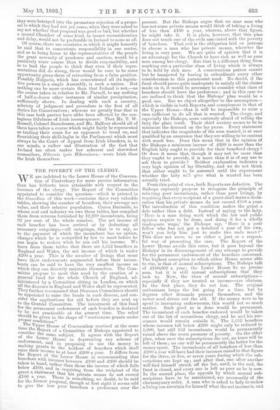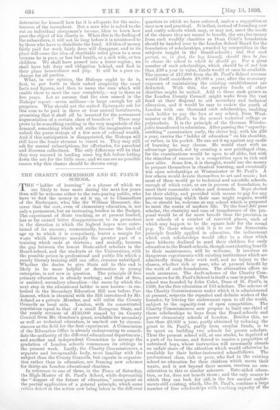THE POVERTY OF THE CLERGY.
WE are indebted to the Lower House of the Convoca- tion of Canterbury for more precise information than has hitherto been attainable with respect to the incomes of the clergy. The Report of the Committee appointed to consider the question—which is printed in the Guardian of this week—contains three very valuable tables, showing the number of benefices, their average net value, and their relative population. Canon Burnside, to whose zeal and industry we owe these tables, has compiled them from returns furnished by 12,299 incumbents, being 92 per cent. of the whole number. The net income of each benefice has been arrived at by deducting all necessary outgoings,—all outgoings, that is to say, as to the payment of which the incumbent has no option, charges which he is compelled by law to meet before he can begin to reckon what he can call bis income. We learn from these tables that there are 5,552 benefices in England and Wales, the net income of which is under £200 a year. This is the number of livings that must have their endowments augmented before their incum- bents can be said to have the very smallest income on which they can decently maintain themselves. The Com- mittee propose to meet this need by the creation of a general fund for the whole Church of England, ad- ministered by a Committee sitting in London, on which all the dioceses in England and Wales shall be represented. They further recommend that Diocesan Committees should be appointed to raise the funds in each diocese, and con- sider the applications for aid before they are sent up to the Central Committee. The investment of this fund for the permanent endowment of each benefice is declared to be not ,practicable at the present time. The relief should be given in the shape of " continuous grants under proper conditions." The Upper House of Convocation received at the same time the Report of a Committee of Bishops appointed to consider the sameb. ct It agrees with the Report of the Lower su je i . endowment, and House n deprecating any scheme of iproposing to use the .money in making grants to raise their income to at least £200 a year. It differs from the Report of the Lower House in recommending that benefices with incomes between £100 and £200 should be taken in hand, rather than those the income of which falls below £100, and in requiring from the recipient of the grant a statement that his private means do not exceed £100 a year. There is something, no doubt, to be said for the former proposal, though at first sight it seems odd to give the less poor benefices a preference over the poorest. But the Bishops argue that no sane man who has not some private means would think of taking a living of less than £100 a year, whereas, above that figure, he might take it. It is plain, however, that this plan does not touch one of the evils associated with the poverty of benefices. That evil is the obligation laid on patrons to choose a man who has private means, wherever the living is very poor. We are quite of opinion that it is an advantage for the Church to have rich as well as poor men among her clergy. But that is a different thing from marking out a particular class of living which is always to be held by rich men. A conscientious patron cannot but be hampered by having to subordinate every other consideration to this paramount need. No doubt, if the fund should prove quite inadequate to satisfy all the claims made on it, it would be necessary to consider what class of benefices should have the preference ; and in this case we are inclined to think that the Bishops' plan would be a good one. But we object altogether to the assumption— which is visible in both Reports, and conspicuous in that of the Upper House—that it will be impossible to raise a sum sufficient to do all that is wanted. The clergy, and especially the Bishops, seem curiously afraid of telling the laity the plain truth. Their chief anxiety seems to be to minimise the demand on the lay purse. Every statement that indicates the magnitude of the sum wanted, is at once qualified by an assurance that they are willing to be content with much. less. Does this mean that in the opinion of the Bishops a minimum income of £200 is more than the English laity ought to provide for their beneficed clergy ? Or does it mean that, though it may not be more than they ought to provide, it is more than it is of any use to ask them to provide ? Neither explanation indicates a very high opinion of lay liberality, and we do not think that either ought to be assumed until the experiment whether the laity wi'.1 give what is wanted has been actually tried. From this point of view, both Reports are defective. The Bishops expressly propose to recognise the principle of relieving poor incumbents, rather than poor livings, by requiring that every recipient of a grant shall make a decla- ration that his private means do not exceed £100 a year. The introduction of this condition makes the grant a. dole rather than a debt. Instead of saying to the laity, Here is a man doing work which the law and public opinion require to be done, and doing it for a wholly inadequate wage,' the Bishops say, Here is a poor fellow who has not got a hundred a year of his own, won't you help him just to make two ends meet ? ' This does not seem to us either a just or a respect- ful way of presenting the case. The Report of the Lower House avoids this error, but it goes beyond the Bishops' in its discouragement of any attempt to provide for the permanent endowment of the benefices concerned. The highest conception to which either House seems able to rise, is that of annual subscriptions. The Bishops talk of £100,000 a year; the Lower House fix no precise sum, but it is still annual subscriptions that they look to. Now, the vices of annual subscriptions— especially if they are treated as income—are obvious. In the first place, they do not last. The original enthusiasm keeps the list going for a time, but by degrees other demands present themselves, and the newer need drives out the old. If the money were to be spent in increasing endowments, this would not so much matter. Such good as is done would be permanent. The incumbent of each benefice endowed would be taken out of the list of necessitous clergy, and he and his suc- cessors would remain outside it. The 5,552 benefices whose incomes fall below £200 might only be reduced to 5,000, but still 552 incumbents would be permanently raised above the worst pressure of poverty. On the other plan, when once the subscriptions die out, no trace will be left of them ; no one will be permanently the better for the money spent. The incumbents of all benefices of less than £200 a year will have had their incomes raised to that figure for the three, or five, or seven years during which the sub- scriptions are kept up ; and after that, one after another will find himself struck off the list, until, in the end, the fund is closed, and every one is left as poor as he is now. In the second place, the appeals by which annual sub- scriptions have to be maintained, are necessarily of the eleemosynary order. A man who is asked to help to endow a living can ascertain for himself what the net income is, and determine for himself how far it is adequate for the main- tenance of the incumbent. But a man who is asked to eke out an individual clergyman's income, likes to know how poor the object of his charity is. When this is the feeling of the subscribers, it will not be long before it is ministered to by those who have to distribute the fund. All idea of money fairly paid for work fairly done will disappear, and in its place will come the idea of charitable relief given to a. man because he is poor, or has bad health, or a sick wife, or ten children. We shall have passed into a lower region ; we shall have left duty and obligation behind, and find in their place benevolence and pity. It will be a poor ex- change for all parties. What, in our opinion, the Bishops ought to do is, first, to put forth in their naked simplicity the exact facts and figures, and then to name the sum which will enable them to meet the case completely,—say in three or five years. Let us assume that the sum named in the Bishops' report—seven millions—is large enough for all purposes. Why should not the united Episcopate ask for this sum to be paid in three or four annual instalments, promising that it shall all be invested for the permanent augmentation of a certain class of benefices ? There may prove to be something exciting in the very magnitude of the demand, something which will strike the imagination and unlock the purse strings of a few men of colossal wealth. And if this anticipation is disappointed, the Bishops will still have the lesser streams to resort to. They may still ask for annual subscriptions, for offertories, for parochial and diocesan collections. The only difference will be that they may succeed in landing some big fish before letting down the net for the little ones ; and we can see no possible reason why this chance should be thrown away.



































 Previous page
Previous page